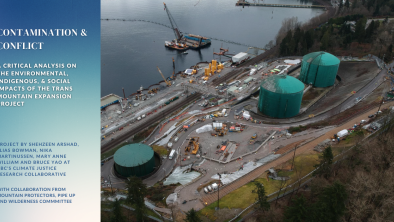Bumpy ride for Omnitrax plan?
Winnipeg Free Press

A national environmental group has vowed to try to block a plan to begin shipping Alberta oil through northern Manitoba's Port of Churchill.
An Omnitrax Inc. official said Tuesday the company's Canadian subsidiary -- Winnipeg-based Omnitrax Canada -- hopes to ship about 3.3 million gallons of light sweet crude oil per year through the port, starting with a test run this October involving a 330,000-gallon tanker ship.
Darcy Brede, Omnitrax Inc.'s president and chief operating officer, said the plan is to haul the oil by rail from The Pas to Churchill along Omnitrax's Hudson Bay Railway line, then load it onto tanker ships at the Port of Churchill, which Omnitrax also owns and operates.
The plan is to load about 10 of the 330,000-gallon tanker ships per year, he said, creating a major new source of revenue that will help ensure the long-term viability of the port.
But a local official with the Wilderness Committee, which bills itself as Canada's largest membership-based, citizen-funded wilderness protection group, said Tuesday the group will do everything in its power to prevent that from happening.
"It's a terrible idea," Eric Reder said in an interview. "There are lots of products that can be shipped through Churchill. But oil? Absolutely not."
Reder said Churchill has a highly successful ecotourism industry, and the Omnitrax plan puts that at risk.
"We're seeing oil spills all over the place," he said, with the most recent high-profile example being last month's deadly train derailment in Lac-M©gantic, Que.
Reder said there's mounting opposition in other parts of the country to new oil pipelines being built and to oil companies shipping more oil by rail.
"And if they try to push oil through Churchill, this will be another battleground."
Brede said Omnitrax expected to encounter opposition from some citizens and environmental groups. But he maintained their fears are unfounded.
He said Omnitrax has safely hauled 2.5 million barrels of light petroleum products -- mainly diesel and gasoline -- over the rail line over the last 15 years.
It already has Transport Canada approval to do that, he said, and had to file a detailed oil-pollution emergency plan with the department before it got its permit.
While the permit and emergency plan will have to be revised to include light crude oil shipments, Brede said he doesn't expect any problem getting Transport Canada approval.
In a bid to address citizens' concerns, the company is holding public meetings this week in Churchill, The Pas and Thompson to outline its plans and to answer questions.
However, the Wilderness Committee isn't the only one voicing concerns about the Omnitrax plan. Winnipeg Centre NDP MP Pat Martin said he's not opposed to oil being shipped through Churchill, but he's worried about whether the rail line can handle such a huge increase in traffic volumes.
There's a big difference between 2.5 million barrels over 15 years and 3.3 million barrels per year.
"And that rail line is going over some of the most difficult terrain of anywhere in the world," the MP said. "We've got to use an abundance of caution to make sure that track is capable of handling that kind of volumes. I'd like to see something comparable to an environmental impact study to assess if this is feasible, viable or desirable as an economic development strategy (for the port)."
The Lac-M©gantic train derailment has already raised serious questions about the safety of Canada's rail lines, the rigour of federal regulations and inspections that are largely left to rail companies themselves to perform.
Premier Greg Selinger said the fallout from the Lac-M©gantic disaster will shine a brighter light on Omnitrax's safety and environmental plans.
"That puts the bar higher for them to demonstrate they'll do it responsibly and safely," said Selinger.
The province has told Omnitrax it must lay out a plan to ensure towns along the rail line won't be at risk, and that spills or derailments won't damage the environment or Hudson Bay.
And Selinger said Canada's premiers recently called for a national tracking system so Canadians know what products are being shipped by rail in real time, as well as rules mandating rail companies carry sufficient insurance. That would add a layer of scrutiny since insurance companies would not cover a railway with lax safety and environmental safeguards.
Omnitrax's plan involves a bit of climate-change irony. Warmer temperatures are keeping Churchill's deep-water port open longer every year, allowing for more and diverse shipments.
But warmer temperatures have also destabilized the northern permafrost, resulting in frequent trouble with the railway's track. That's why Ottawa, the province and Omnitrax agreed in 2007 to spend $60 million repairing the tracks.
And, Alberta is easily the country's largest greenhouse gas emitter, thanks primarily to the oilsands. Allowing transportation of that oil to market bolsters Alberta's oilpatch growth and its emissions.
Asked whether it makes sense to allow more Alberta oil through Manitoba, Selinger was pragmatic.
He said allowing Alberta sweet crude to be shipped via Churchill improves Canada's domestic energy security, in part by reducing the amount of oil the East Coast buys from Venezuela. And it allows Canada to ensure its oil is as clean as possible.
This story also appeared in the Brandon Sun.


